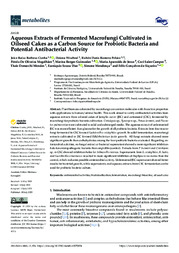Aqueous extracts of fermented macrofungi cultivated in oilseed cakes as a carbon source for probiotic bacteria and potential antibacterial activity.
Aqueous extracts of fermented macrofungi cultivated in oilseed cakes as a carbon source for probiotic bacteria and potential antibacterial activity.
Author(s): CUNHA, J. R. B.; WISCHRAL, D.; PELÁEZ, R. D. R.; MAGALHÃES, P. de O.; GUIMARÃES, M. B.; JESUS, M. A. de; SALES-CAMPOS, C.; MENDES, T. D.; DIAS, E. S.; MENDONCA, S.; SIQUEIRA, F. G. de
Summary: Plant biomass colonized by macrofungi can contain molecules with bioactive properties with applications to human/animal health. This work aimed to verify antibacterial activities from aqueous extracts from oil seed cakes of Jatropha curcas (JSC) and cottonseed (CSC), fermented by macrofungi for probiotic bacteria cultivation. Coriolopsis sp., Tyromyces sp., Panus lecomtei, and Pleurotus pulmonarius were cultivated in solid and submerged media. The aqueous extract of unfermented JSC was more efficient than glucose for the growth of all probiotic bacteria. Extracts from four macrofungi fermented in CSC favored Lactobacillus acidophilus growth. In solid fermentation, macrofungi extracts cultivated in JSC favored Bifidobacterium lactis growth. All fungi extracts showed more significant growth than carbohydrates among the four probiotic bacteria evaluated. Regarding antimicrobial activities, no fungal extract or bacterial supernatant showed a more significant inhibition halo for enteropathogenic bacteria than ampicillin (control). Extracts from P. lecomtei and Coriolopsis sp. in CSC showed inhibition halos for Salmonella enterica. Supernatants from L. acidophilus, B. lactis, and Lactobacillus rhamnosus resulted in more significant inhibition of Staphylococcus aureus than the control, which indicates possible antimicrobial activity. Unfermented JSC supernatant showed better results for bacterial growth, while supernatants and aqueous extracts from CSC fermentation can be used for probiotic bacteria culture.
Publication year: 2023
Types of publication: Journal article
Unit: Embrapa Agroenergy
Observation
Some of Embrapa's publications are published as ePub files. To read them, use or download one of the following free software options to your computer or mobile device. Android: Google Play Books; IOS: iBooks; Windows and Linux: Calibre.
Access other publications
Access the Agricultural Research Database (BDPA) to consult Embrapa's full library collection and records.
Visit Embrapa Bookstore to purchase books and other publications sold by Embrapa.

